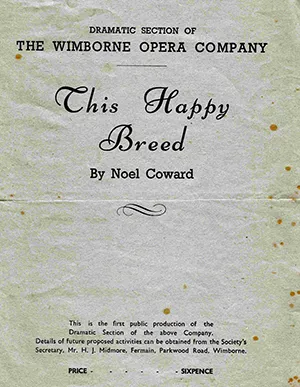Written By
Noel Coward
Where and When
September 1948 @ The Women’s Institute Hall, Wimborne
The Plot
This Happy Breed covers twenty years in the life of the Frank and Ethel Bibbons and their children, from the end of World War I to the beginning of World War II. On one level the story is the chronicle of a middle class family. They haven’t done well in the years between the wars, but in the face of another conflict, family unity spans the chasm between the generations. At another level, this is the story of England, torn at times by the conflicts of its own progress, but quietly firm in its historical moments of crisis.
Cast
- Mrs Flint – Katherine Purchas
- Ethel – Peggy Badham
- Sylvia – Myfawnwy Stearns
- Frank Gibbons – Tony Davison
- Bob Mitchell – Ronald Small
- Reg – Michael Warwick
- Queenie – Pam Mottram
- Vi – Sylvia Goffe
- Sam Leadbitter – George Burry
- Phyllis Blake – Sonia Wheeler
- Edie – Margaret Bundy
- Billy – Len Taylor
Creative Team
- Producer – L. H. Mottram
- Stage Manager – D. Gould
- Set Design – W. R. Plumridge
- Set Painting – Megan Jones, D. Gould, N. Bundy and P. Cornick
- Stage Furnishings – D. Gould and L. Stacy
- Hair and Make-up – Kay Burdett
Gallery

Reviews
Ambitious Amateurs
For their first public performance the dramatic section of the Wimborne Opera Company plunged deeply into Noel Coward’s moving presentation This Happy Breed. The play reflected credit on its producer, Mr L. H. Mottram.
On Thursday and last night audiences in the Women’s Institute Hall watched with critical but appreciate eye the three acts which evolve in one commonplace living room at No. 17 Sycamore Road, Clapham. The family – an ordinary one with their own personal human dramas – are admirably characterised by the local group.
Special credit should be given to Katherine Purchasas the queruous, difficult old Mother, Mrs Flint, to the melancholy Sylvia (Myfawnwy Searns), and her son Frank (Ronald Davison) whose convincing performance as a father embodied the family atmosphere even on a small stage.
Able support was given by his wife (Peggy Badham) who grew old gracefully through the changing scenes. The neighbour, Bob Mitchell (Ronald Small) was bright and breezy, and George Burry was true to life as Sam Leadbitter. Of the children Queenie (Pam Mottram) took a spirited lead. Laughter greeted Edie the maid (Margaret Bundy) immediately she entered. She maintained a poker face, even if her movements were also rather stiff. Billy (Len Taylor) was one of the most natural and convincing members of the cast. He acted with understanding, his movements were easy, and he remembered his accent.
Both entrances and exits were good and the stage settings were attractive. Furniture and costumes were appropriate to the period and did justice to the setting.
The story is set in a period of tension – the fringes of two world wars – and the players managed to keep the audience on the brink of the uncertain in a manner which would have done credit to professional players.
Any forebodings of a hazardous undertaking which the versatile producer (Mr L. H. Mottram) had in the selection for presentation by a group of small towm enthusiasts of Noel Coward’s play, This Happy Breed, were rapidly dispelled by the warm appreciation of large audiences in the Women’s Institute Hall, Wimborne on Thursday and Friday nights. A good deal of the acting by members of the Wimborne Opera Company (who appeared in their first public production) merited unstinted praise and reflected great credit on the efforts of the producer.
Domestic scenes figure largely in the play, the action of which passes in the dining-room of a house in Sycamore Road, Clapham, occupied by a cockney family named Gibbons and the casting was excellent. Two outstanding impersonations were those of Peggy Badham and Tony Davison who as Mr and Mrs Frank Gibbond, parents of somewhat irresponsible children, and surrounded by talkative relatives, dominated the pay.
Equally successful was Katherine Purchas (Mrs Flint) as the querulous mother-in-law of Frank, whilst admirable support was given bt Myfawnwy Stearns (Sylvia, sister of Frank), Pam Mottram (Queenie), daughter of the producer, and Sylvia Goffe (Vi), Frank’s children; Ronald Smithe, who as Bob Mitchell, enlivened several binge incidents with his old sailor friend Frank, Len Taylor (Billy a sailor), Margaret Bundy (Edie, a maid), Michael Warwick (Reg), George Burry (Sam Leadbitter), and Sonia Wheeler (Phyllis Blake).
D. Gould was stage manager, Barbara Burry was raely called upon to prompt, whilst stage set was made by W. R. Plumridge and painted by Megan Jones, D. Gould, N. Bundy and P. Cornick; members of the cast and crew were responsible for the dresses, Kay Burdett for the coiffure and make-up, and D. Gould and L. Stacey for the stage furnishings.
Mr Mottram is chairman of the dramatic section of the Society. Mrs Badham hon treasurer, and Mr H. J. Midmore hon secretary.
The paly is being repeated at Ferndown tonight (Friday)




